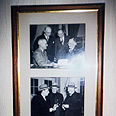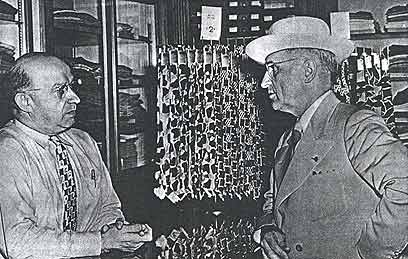
The man who saved the Negev
In 1948, Israel's future took a terrible blow after Jewish lobby failed to convince President Truman to recognize State's proposed borders. Eddie Jacobson, a lifelong friend of Truman's, helped change the situation by convincing Truman to meet President Weizman
The city of Tulsa, Oklahoma is rarely considered an important center of Jewish life, certainly not a Zionist hub. It has a population of half a million, but only 3,000 of them are Jews. Still, one house in the city contains an item paramount to the establishment of the State of Israel - the pen President Harry Truman signed the official document recognizing the Jewish state in 1948.
Stored safely in the home of Tulsa resident Gloria-Galia Shusterman, its fascinating story begins with Shusterman's father, Edward (Eddie) Jacobson.
Born in 1891 to a family of Russian Jewish immigrants in New York, Jacobson's family eventually settled in Kansas City, Missouri. In 1917, Jacobson enlisted in the 35th Infantry Division, where he became close friends with a young officer, Harry S. Truman.
Returning home from the war the two friends went into business together and founded Truman & Jacobson, a men's clothing store in downtown Kansas City which enjoyed initial success but went bankrupt after the 1921 recession. Truman went into law and politics, winning a seat in the US Senate in 1934. Jacobson remained a businessman.

Jacobson (left) with President Truman
In 1944 Truman was elected vice president under Roosevelt and eventually succeeded him as president following Roosevelt's death in 1945.
Jacobson remained close to Truman throughout the years, but - as his daughter pointed out - "he never used it for personal gains." After Jacobson passed away, Abba Eban said: "He never took advantage of his relations with the president, except for the benefit of America's needs and interests."
Mr. Jacobson goes to the White House
In 1947, Truman endorsed the UN plan for the partition of Palestine between its Arab and Jewish populations. But the plan excluded the Negev region, practically all of Israel's south.
Prominent Jewish activists lobbied hard to persuade the Truman administration to recognize the Negev as part of Israel's extended boundaries in the hopes that post-war America's unprecedented influence would bring other countries to support the idea.
In one of the heated meetings between the Jewish leaders and Truman, Abba Hillel Silver reportedly banged on the president's desk with his fist. Unimpressed, Truman ordered his secretary not to schedule any more meetings on the subject.
Desperate, the Jewish leadership summoned the ailing Chaim Weizmann to Washington. Truman was resolute and refused to take a meeting with Weizmann, who waited in the Waldof Astoria hotel in New York.
It was Frank Goldman, president of B'nai Brith at the time, who recalled Truman's trusted friend from his home state and telephoned Eddie Jacobson in the middle of the night for help.
Jacobson, who was not particularly active in the Zionist cause, consented. He flew to Washington the following day, March 13th 1948 and went to see Truman immediately.
"Why would you not see Weizmannn?" Jacobson asked his old friend as the two sat across from each other in the Oval Office.
The president, who remained adamant on his decision to refrain from dealing with Zionist issues anymore, stood and turned to look out the window at the White House garden. Jacobson noticed a small bust of President Andrew Jackson, whom Truman greatly admired. Speaking to Truman's back Jacobson said: "I too have a hero I admire. The greatest Jewish leader of all times - Chaim Weizmann. The man is sick, almost blind, and yet he traveled thousands of miles just to see you, in the name of his people. Why will you not see him?"
A deafening silence gripped the room - "it seemed like ages and ages to me," Jacobson would later say – before the president turned around, looked his friend straight in the eye, and said: "You won, you bastard. I'll see Weizmann."
And so the historic meeting would take place, with Weizmann famously convincing Truman to include the Negev in his recognition of the future Jewish state, a move contrary to the official stand of the US State Department at the time and the boundaries specified in the original partition plan.
Truman later presented Jacobson with the pen he used to sign the official papers recognizing the state of Israel. In her home in Tulsa, Gloria keeps the pen next to her picture of the corresponding ceremony, which Jacobson attended.
Late Israeli President Chaim Herzog once asked her to donate or at least allow the pen to be put on temporary display in Jerusalem, said Gloria, but she refused. "This pen stays in the family," she said.










